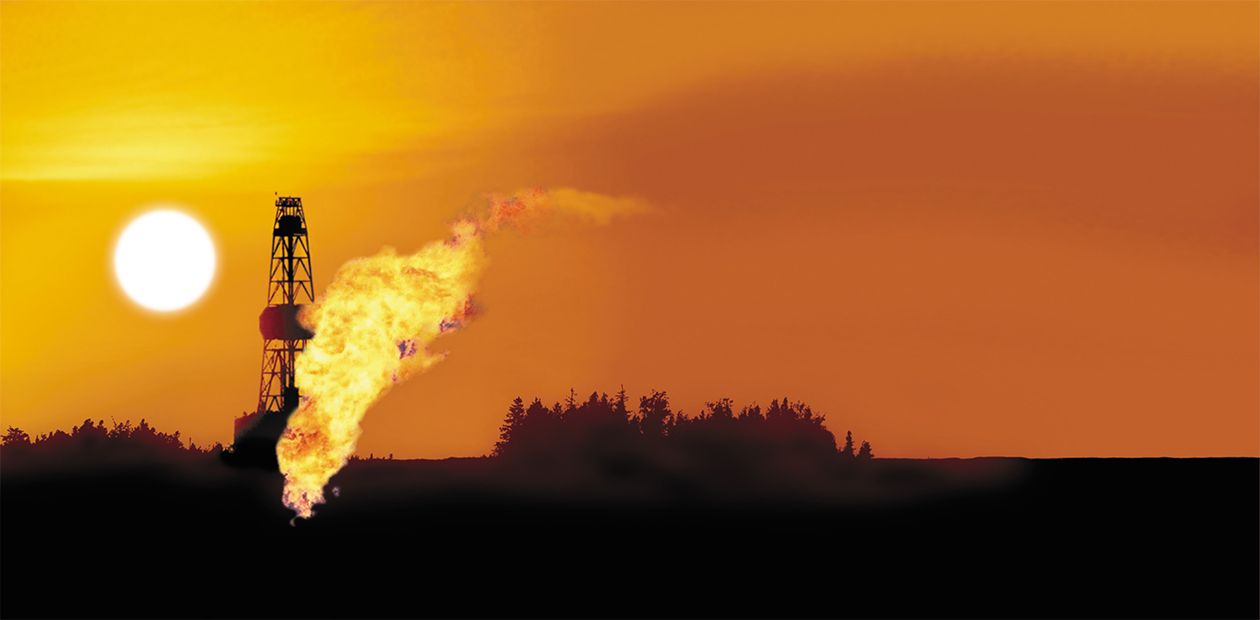Oil is Global!
n June 5, 2009, at the St. Petersburg Economic Forum, the Global Energy International Prize was awarded to the Russian geologists Academicians Aleksey E. Kontorovich and Nikolay P. Laverov for fundamental research, methods and technologies applied in the exploration and development of oil, gas and uranium deposits; establishing a scientific foundation for claiming large areas of energy feedstock. The third scientist who shared the award with our compatriots was Professor Brian Spalding from Great Britain
This prize, which is considered to be an analog of the Nobel Prize in the field of energy, has been awarded annually since 2003 to two or three people. In the seven years more than 1600 scientists from many countries have been nominated for it, and 10 foreign and 10 Russian scientists received it including three persons from Siberia. In 2003 it was given to Academician G. A. Mesyats and in 2007 to Academician V. E. Nakoryakov. And now this honor was brought to the Siberian Branch of the Russian Academy of Sciences (SB RAS) by Aleksey E. Kontorovich.
This year was the first time when the Prize was given for fundamental research on scientific justification of very large oil-and-gas and uranium-containing provinces having global significance, as well as for the works on the theory and methods of forecasting, search and exploration of such provinces.
The progress of our geologists in this field has been universally recognized from before the World War II: they provided a great world power with oil, gas, and coal for many years. When speaking of the achievements of modern geology as presented by A. E. Kontorovich, it is appropriate to remember the prominent predecessors and teachers of the contemporary generation of scientists.
At the beginning of the 20th century, all oil of Russia and, later, of the USSR was concentrated primarily in Azerbaijan and North Caucasus. In the 1920s—1930s Soviet geologists suggested new ideas on where to look for oil.
The oil-bearing capacity of the ancient Cambrian layers of East Siberia was first indicated by Academician A. D. Arkhangel’skii in 1929. Time showed that he was right in determining locations, and the age of the main oil-and-gas bearing horizons was even older than he supposed. At present, oil and gas have been found in East Siberia in more ancient upper Proterozoic layers (from 1 billion to 540 million years old).
In 1932 Academician I. M. Gubkin predicted the possibility of discovering big oil in West Siberia. It was a discovery resulting exclusively from scientific forecast since, in contrast to the old oil areas, the oil fields of West Siberia have no signs of oil on the earth’s surface. It was a brilliant scientific prediction based on the scientist’s outstanding intuition. Gubkin believed that Siberia had enough oil to provide all of the USSR, and he has proven to be right. Back at that time, though, many well-known geologists did not take his forecast seriously.
I. M. Gubkin was the first to suggest a new method for studying oil-and-gas provinces by conducting regional geophysical works and by formation and parametric drilling. This approach still remains the basic one. It has allowed Soviet scientists to discover many oil-and-gas provinces in the east of the European part of the country, in Siberia and the Russian Far East, in Central Asia and Kazakhstan, and in the west sector of the Russian shelf of the Arctic Ocean.
Gubkin’s forecast for West Siberia was put in practice after the World War II with the help of many prominent scientists: N. N. Rostovtsev, A. A. Trofimuk, F. G. Gurari, V. P. Kazarinov, M. K. Korovin, V. D. Nalivkin, I. I. Nesterov, V. S. Surkov; outstanding organizers of prospecting industry Yu. G. Erv’ye, L. I. Rovnin, F. K. Salmanov, V. V. Semenovich, I. A. Ivanov, Yu. K. Mironov, V. T. Podshebyakin, N. G. Rozhok, and L. G. Tsibulin. In the mid–1960s the oil-and-gas resources of West Siberia began to be developed. They not only satisfied the needs of the USSR, but also made our country the largest exporter in the world.
I. M. Gubkin gave scientific foundation to the discovery of the Volga-Ural oil-and-gas province, where great results were obtained by the young geologist, one of the future founders of the Siberian Branch of RAS A. A. Trofimuk. In the war years, when oil from Caucasus was delivered in a roundabout way, through Central Asia and Siberia, oil gushed in Bashkiria yielding 2,000 tons a day! In 1944, the thirty-three-year-old A. A. Trofimuk became the first geologist to be honored with the title of the Hero of Socialist Labor. His and his team-mates’ contribution to the victory in WWII is hard to overestimate. Oil from Trofimuk’s wells went directly to refinement plants and on to the frontline.
When the war was over, the importance of “black gold” did not decrease. The first general assembly of the West-Siberian Branch of the USSR Academy of Sciences (created in 1944) was held on May 10, 1945, and the only problem discussed was resumption of oil exploration in West Siberia.
In three years, the first wells were drilled and exploration organizations were created. In 1953 industrial gas was obtained in Berezovo, and a year later, the first films of oil were found in Kolpashevo.
Since the late 1950s, Aleksey E. Kontorovich has actively participated in scientific justification, exploration, and development of Siberian oil-and-gas provinces. He created fundamentals of the methods for oil-and-gas content prediction, supervised the development of new methods for quantitative analysis of energy resources’ structure and techniques to estimate the prospects of the largest oil-and-gas basins in Russia, Central Asia, and China. For many decades he has remained a leader in scientific prospecting of oil and gas fields in West Siberia. Aleksey Kontorovich’s name was given to an oil field in the Tomsk oblast.
Together with the Academicians A. A. Trofimuk and V. S. Surkov, A. E. Kontorovich played a special role in justification of oil-and-gas content of the Precambrian of the Siberian Plate, discovery of Lena-Tunguska oil-and-gas province, scientific maintenance of prospecting and estimating works in Vankor, Verkhnechon, Dulis’min, Kuyumbin, Srednebotuoba, Suzun, Chayandin, Yurubcheno-Tokhom, and other fields, as well as in the justification of the route of the East Siberia-Pacific Ocean oil pipeline and in the development of the concept of establishing new oil and gas centers in East Siberia and Republic of Sakha (Yakutia).
Even though search and development of oil-and-gas resources remains an important task, farsighted scientists are already thinking of the ways to transfer a large part of Russian power industry to coal. In March this year, A. E. Kontorovich, who is the scientific supervisor of the Novosibirsk Institute of Oil-and-Gas Geology and Geophysics SB RAS, became the head of the Kemerovo Research Center.
His major task in this position is to unite the efforts of the regional administration and research institutes of SB RAS, to develop a scientific approach to transferring Kuzbass to a new, innovational way of development. It is also planned to start the production of coal bed methane, an unconventional natural resource whose geological reserves are considerable.
The rumors that hydrocarbon reserves on Earth will soon be exhausted and we will be left without energy resources are greatly exaggerated. As for oil, the prize-winner believes that towards the 2050s the level of world production will decrease and by the end of the century it will drop to 2—2.5 billion tons per year (today it is 4 billion tons). However, many countries have giant fields of heavy oil, which is more difficult to produce – it is bituminous sands and shales deposited at a depth of 2—3 km, which can provide a whole complex of oil products. There are sites where shales are found near the surface – for example, along the Lena River from the Arctic Ocean to the Aldan. Reserves of such oil are sufficient to keep the current level of production to the end of this century and, possibly, in the 22nd century, too.
During the whole history, people have managed to solve any problems posed by the development of the civilization. In our search for new powerful energy resources we leave the habitable regions for more and more hard-to-reach areas. The Russians have never been afraid of such difficulties, and our geology will more than once have its say in response to the global power challenges of our time.
Following the development of East Siberia, we are to face the Arctic region and the Arctic Ocean. Together with Academician N. L. Dobretsov, A. E. Kontorovich is beginning a round of studies into the mineral resources of the Arctic region. The Siberian Branch of RAS has been working consistently on putting into life the great words of the first Russian Academician Mikhail V. Lomonosov: “The might of Russia will grow through Siberia and the Arctic Ocean”.










